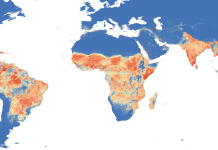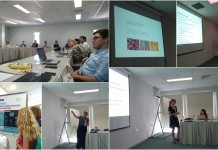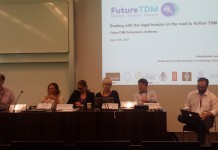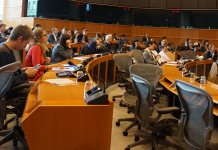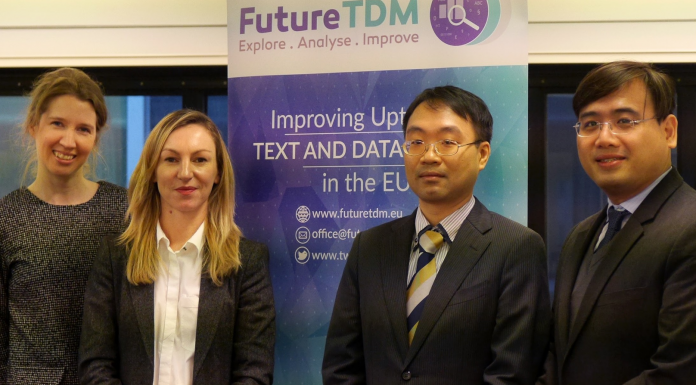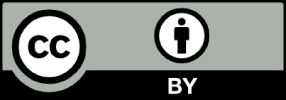While discussions at the EU on copyright reform and an exception for text and data mining (TDM) are very much live, FutureTDM, a Commission funded project of TDM experts has, for the past year, already been gathering information, mapping the TDM landscape and listening to the wide variety of individuals and organisations involved in data analytics. The project has just produced the first in a series of reports, providing a range of stakeholders with recommendations to improve TDM uptake in the EU. This FutureTDM policy framework document sets out high-level principles and recommendations.
With copyright reform being processed at the EU institutions over the coming months, we take a look in this blog at the FutureTDM policy framework recommendations for legislators; further stakeholder guidelines will be highlighted in upcoming project materials.
The FutureTDM policy framework distinguishes three types of barriers that need to be overcome:
- Uncertainty: barriers are formed by uncertainty, for example those surrounding the legality of TDM or its economic potential for the private sector.
- Fragmentation: different (national) rules, standards, requirements or languages, among others, result in a fragmented market and arbitrary boundaries that withhold industry and science to exploit the full potential of TDM technologies.
- Restrictiveness: access to and use of TDM tools and sources can be restricted by factors such as the law, capability of technologies, limited access, etc.,
The FutureTDM policy framework is set up to reply to these barrier types by setting three high level principles that should be the foundation of every stakeholder action that aims to promote TDM. These principles are:
- Awareness and Clarity: actions should improve certainty on the use of TDM technologies. Information and clear actions are crucial for a flourishing TDM environment in Europe.
- TDM without Boundaries: insofar as appropriate, boundaries should be cleared to prevent and take away fragmentation in the TDM landscape.
- Equitable Access: access to TDM tools and technologies, as well as sources (such as datasets), are indispensable for a successful uptake of TDM, but usually comes at a price. While a broadest possible access to tools and data should be the aspiration, providers of these also have a legitimate interest in restricting access, for example for the protection of their investments or any privacy related interest. A right balance must therefore be found, hence the label Equitable Access.
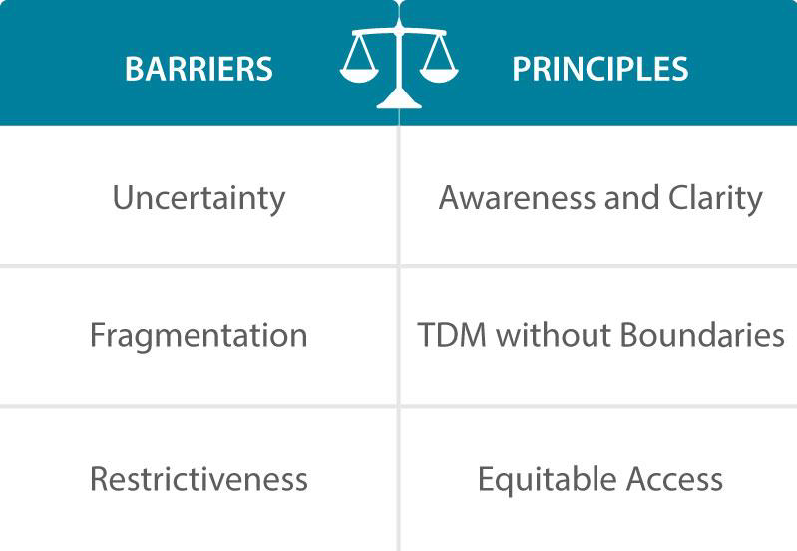
Based on our extensive evidence gathering, these high-level principles have guided us in making more concrete recommendations for different stakeholders. Among those stakeholders, we addressed the European lawmaker and made the following recommendations that are relevant in the current discussions in the context of copyright reform.
Awareness and Clarity
One principle is to have clear rules on copyright and the sui generis database regime. The European legislator can achieve this by minimising borderline cases where it is unclear whether copyright or related laws apply, by clearly defining terms and concepts (e.g. research organisation, text and data mining or scientific research purposes) in law-making.
TDM without Boundaries
Harmonised and mandatory rules on copyright and sui generis database law are a remedy against a fragmented legal landscape in Europe. In this context, we made several recommendations to the European lawmaker:
- Introduce a harmonised, mandatory exception to copyright for TDM activities, and minimise the leeway for deviating interpretations by national legislators and courts to ensure harmonisation in practice as well as in principle.
- Ensure this TDM exception allows for the same exempted activities under both copyright and database law.
- Ensure this TDM exception does not discriminate between commercial and non-commercial organisations or activities, as this distinction may not always be possible in practice.
- Ensure this TDM exception applies only in cases where practitioners have lawful access to content, to respect the rights of content owners.
- Ensure that TDM results can be disseminated while protecting the interests of other stakeholders.
Equitable access
In the light of the TDM exception that is proposed by the Commission and currently discussed by the European Parliament, we have proposed to design such an exception in the following way to ensure that it reflects a fair balance between the interests of TDM practitioners and rightholders and to reaffirm that ideas and facts as such are not protected:
- Introduce a mandatory copyright exception for TDM activities that:
- permits uses that do not trade on the underlying creative and artistic expression of the content analysed,
- requires lawful access by the user,
- is not overridable by contract, and
- only permits technical measures that are necessary, reasonable and proportionate to guarantee the security and integrity of content providers’ infrastructure.
- Make sure that circumvention of technical protection measures (TPMs) and digital rights management (DRM) is permitted, without harming the said security and integrity.
In highlighting the EU level aspects of the FutureTDM policy framework report, we hope to provide a very timely and focussed overview of recommendations relevant to the Brussels copyright reform debate.
Of course, increasing TDM in the EU can also be achieved in a number of other ways through policy and practice and relating to education, skills, technology, infrastructure, tools and economy. The Knowledge Base on the FutureTDM Platform will soon dedicate a full section on these issues and, in the meantime, the full policy framework report and subsequent guidelines for stakeholders can be found in our Knowledge Library.
// All blog posts are the personal opinion of the bloggers. For more information see FutureTDM's DISCLAIMER on how we handle the blog. //




